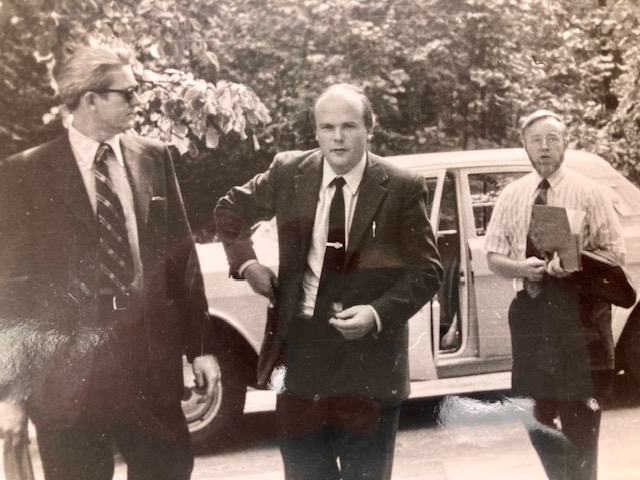
In the 1960s, fusion experiments of all types worldwide were suffering from poor performance until the so-called "tokamak" concept emerged in the USSR (tokamak translates to "toroidal magnetic chamber"). Starting in 1970s, countries around the world had rallied around the tokamak concept although the world was, politically, still hampered by the "cold war" with the USSR.
In 1973, US president Nixon and USSR president Brezhnev signed an agreement to cooperate on the peaceful uses of atomic energy, including fusion. A joint US-USSR Fusion Power Coordinating Committee was established. The first meeting of that committee was held in the USSR in 1974, with Evgeny Velikhov heading the USSR team.
During the rest of the 1970s and into the 1980s, major new tokamaks were constructed around the world, including the Joint European Tokamak (JET) in the UK and the Tokamak Fusion Test Reactor (TFTR) at Princeton in the U.S. The US, the EU and others began to plan for even more advanced tokamaks with performance goals closer to what would be required for fusion power plants. These efforts were hampered by the large costs associated with such new facilities, and none moved forward.
In April 1986, the nuclear fission power plant at Chernobyl in the USSR suffered a partial meltdown of the core of one of the 4 reactors at the site, resulting in what has been called "the worst disaster in the history of nuclear power generation". Several explosions triggered a large fireball and blew off the heavy steel and concrete lid of the reactor, spewing radioactive material into the air and over a wide area. USSR president Gorbachev assigned Evgeny Velikhov to take charge of the response. He became Director of the Kurchatov Institute in Moscow in 1988.
In November 1985 US president Reagan and USSR president Gorbachev had had a Summit meeting in Geneva. Since his inauguration in 1981, Reagan had been calling the USSR the "evil empire". However, a little noticed agreement on fusion was signed at that Summit stating "The two leaders emphasized the potential importance of the work aimed at utilizing controlled thermonuclear fusion for peaceful purposes and, in this connection, advocated the widest practicable development of international cooperation in obtaining this source of energy, which is essentially inexhaustible, for the benefit of mankind." Evgeny Velikhov was a science advisor to Gorbachev and is widely thought to have been instrumental in advising Gorbachev on this matter. This launched discussions that eventually led to the 7-party agreement that currently is the ITER Project and a more-than-a-decade, multiparty design effort, culminating in a decision to construct ITER in France. Velikhov chaired the ITER Engineering Design Board from 1992-2001. ITER is governed by a multi-nation ITER Council. Velikhov became a member of the Council in 2006.
On being notified of Velikhov's passing, Russian president Vladimir Putin sent a telegram to Velikhov's family stating "The passing of Yevgeny Velikhov is a tremendous and irreparable loss for Russian science, as well as for our country, which he honestly and selflessly served all his life. Academician Velikhov was an outstanding physicist and innovator who possessed inexhaustible creative energy. His exceptional professionalism, management and leadership skills, and vast experience were invariably in demand in responsible projects. The projects he worked on were a true reflection of the colossal calibre of his personality.Yevgeny Velikhov was always full of new, daring ideas and designs. This is how he will be remembered by his family, friends, colleagues, and students. He will forever remain in our memory."
Viktor Matveyev, the scientific director of the Joint Institute for Nuclear Research (JINR) commented to Isvestia: "Evgeni Velikhov was a student of academicians Igor Kurchatov and Anatoly Alexandrov, he was a man who is widely known in the world due to his pioneering contribution to the development of fundamental and applied research in nuclear physics and, in particular, the creation and development of a new scientific direction related to the peaceful use of thermonuclear energy in the interests of all mankind."
Anatoly Krasilnikov, director of the ITER Project Center, a part of Rosatom, said, "Evgeny had enormous scientific authority, but at the same time he was a democratic person and equally skillfully won over both students and heads of state. Ultimately, it was these qualities that helped him convince the heads of the world's leading powers to support this initiative and invest in the construction of ITER."
Robert Hirsch, head of the US fusion program during the 1970s said "He was a major influencer in fusion in our days. Politically superior in his system".
Pietro Barabaschi, Director General of the ITER orgnization, noted that Velikhov "was an exceptional and incredibly far-sighted person, with a brilliant mind, impeccable honesty and a wonderful sense of humor, always ready to joke, even in the most unexpected situations."
As a sign of mourning, the ITER flag,which flies over the cental office of ITER in Cadarache, France, will be at half staff for seven days.

Al Trivelpiece (left) and Steve Dean (right), with Evgeny Velikov at the first meeting of the US-USSR Fusion Power Coordinating Committee. 1974.